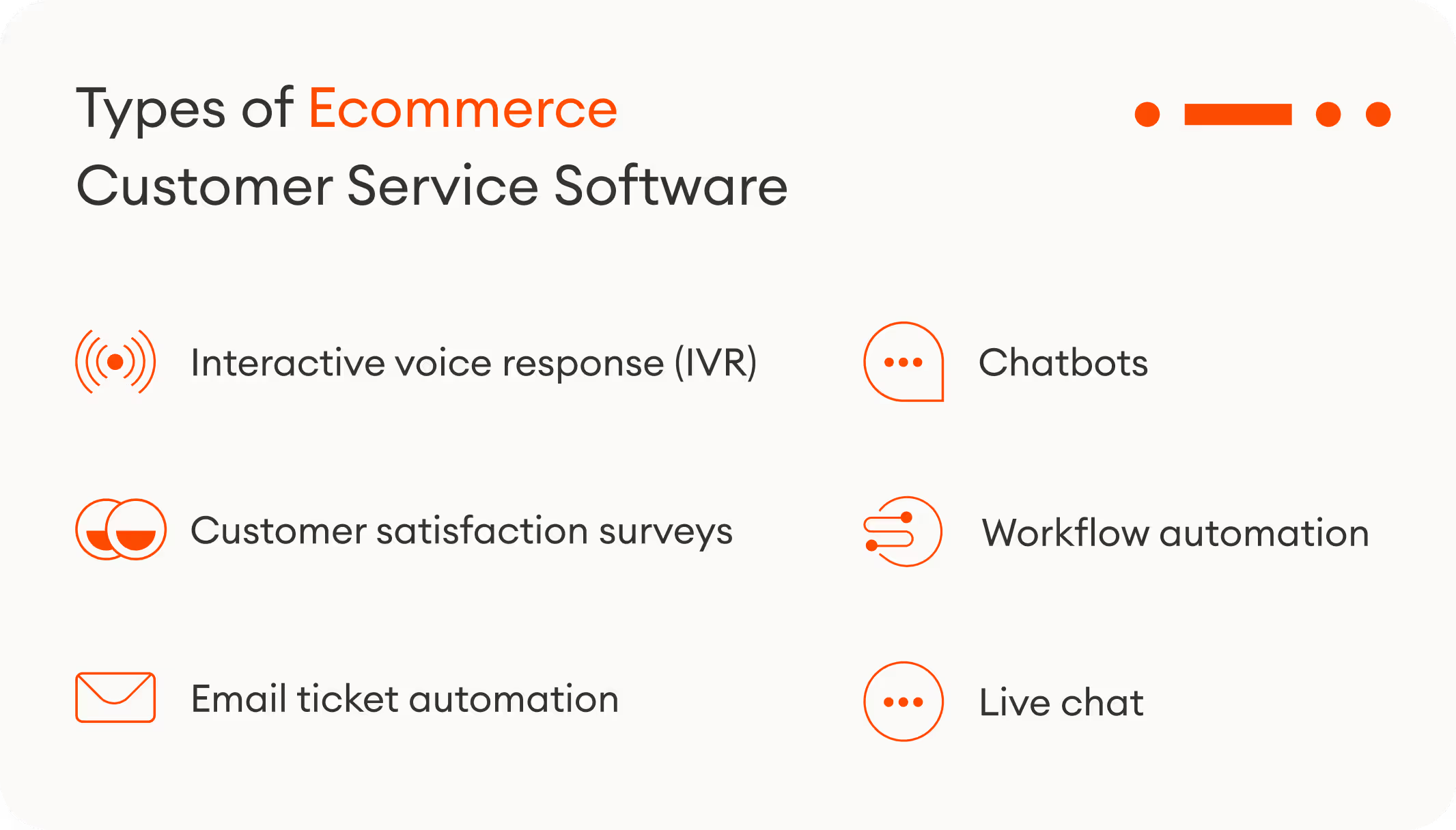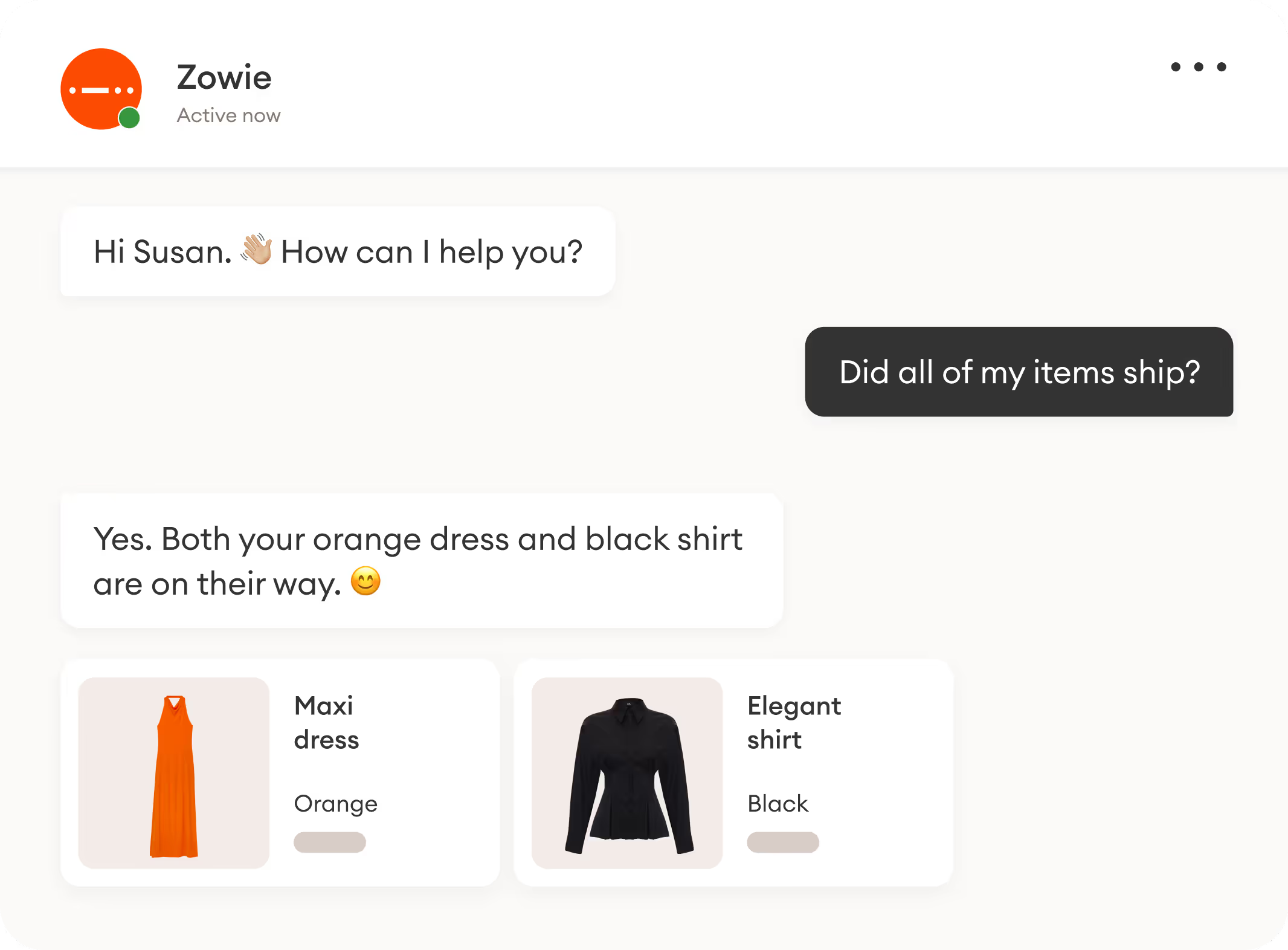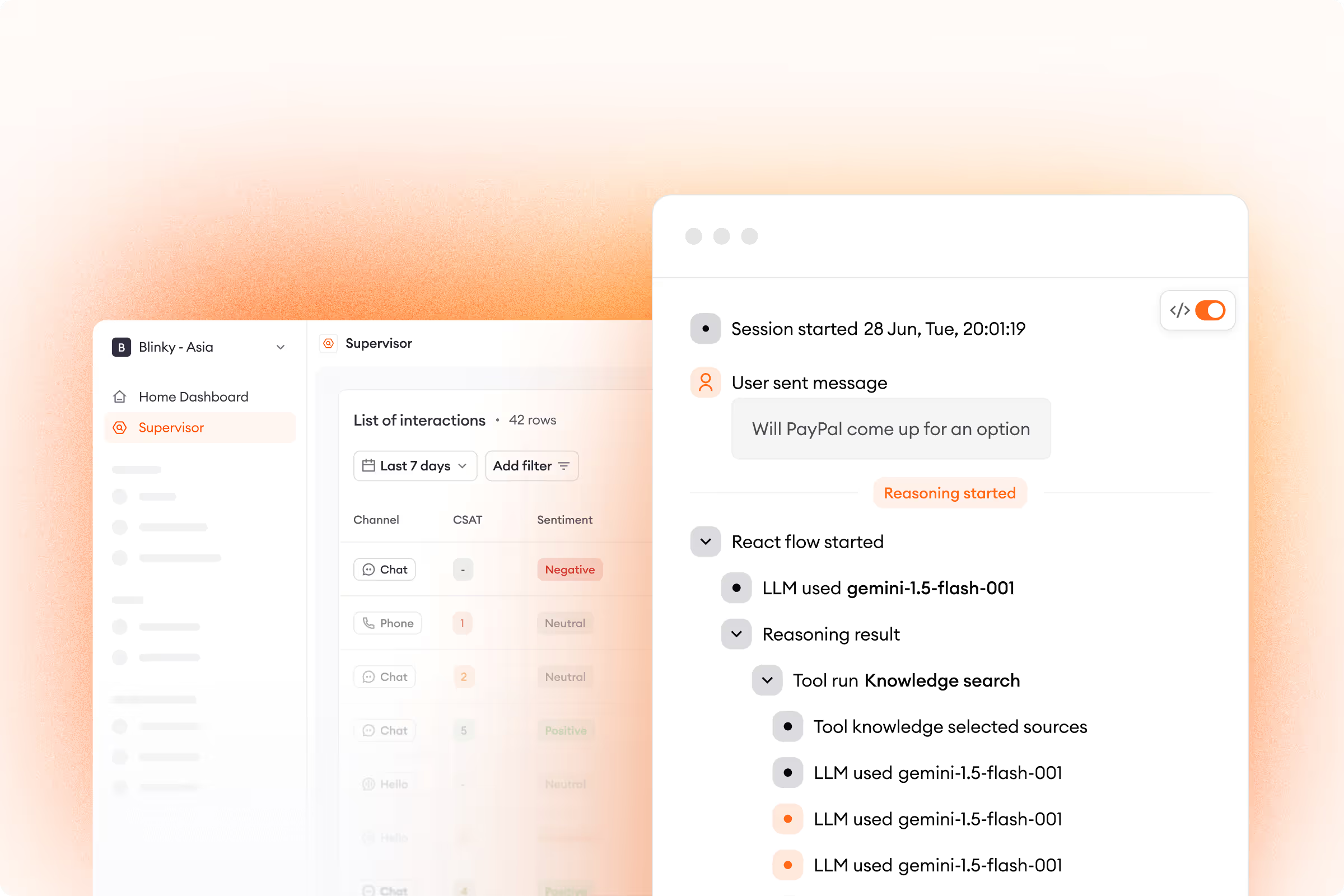Stop me if this sounds familiar.
Your business starts to grow, but so does your volume of incoming support tickets. You worry your team members won’t be able to handle this rise in requests, so you turn to ecommerce customer service software to help you out. After all, it’s designed to keep you organized, boost efficiency, and improve the overall customer experience.
Yet, you’ve suddenly hit a roadblock: how do you know which solution can actually get the job done?
There are scores of options out there promising everything under the sun. However, only a few have that X factor that can really transform your customer service.
In this guide, we’ll explore what to look for when evaluating ecommerce customer service software and how these solutions can benefit online businesses.
What is ecommerce customer service software?
Ecommerce customer service software is an umbrella term that describes any set of tools that allows online businesses to provide support to shoppers throughout the customer journey. While not synonymous with the term, this software is often linked to automation technology, which plays a vital role in ensuring companies are able to deliver personalized customer service at scale.
Customer service tools come in all shapes and sizes, just like ecommerce businesses themselves. What works for another company — even your closest competitor — might not work for you. To find the right software, you’ve got to look under the hood and see how much each can offer your organization, customer service team, and customers.
Here are the main types of ecommerce customer service software:

Live chat
Live chat software connects customers with agents, allowing them to ask questions in real time as they shop at an ecommerce store. Often a feature of a chatbot, a live chat widget allows support teams to provide faster answers to customer questions than on any other support channel.
Chatbots
Chatbots are AI-powered virtual assistants that can automate customer questions, removing tickets from support queues. Through the use of Natural Language Processing (NLP), generative AI, and other advancements, chatbots can deliver natural, conversational customer interactions. What makes this technology truly powerful is its ability to offer personalized support at scale, assisting customers throughout their customer journey.
Chatbots can guide users to knowledge base resources, help with existing orders, provide product recommendations, and even clear hurdles that lead to cart abandonment. By taking repetitive tickets away from support representatives, chatbots enhance the chat experience by providing instant responses, ensuring 24/7 availability, and freeing up human agents for more complex issues.

Email ticket automation
Emails often account for the majority of incoming support queries, but manual email ticket management is often time-consuming. Today, the chatbot experience can be recreated over email to allow automated responses to frequent requests like shipping updates, promotional offers, and product returns. By automating these communications, ecommerce businesses can ensure timely and consistent messaging, improve customer engagement, and drive repeat purchases. Email automation is a relatively new feature, as message length and complexity previously made emails difficult to automate.
Workflow automation
Customer service software can automate many business processes and tasks to streamline operations and improve efficiency. Leading ecommerce platforms can act as ticketing systems and prioritize tasks, integrate with CRM systems, and auto-assign customer questions to agents. Now, rather than giving agents the choice of what they respond to, tickets are automatically assigned based on categories such as priority, urgency, or type.
Customer satisfaction surveys
Satisfaction surveys are tools that collect customer feedback about the user experience with a product, service, or interaction. They can be sent at several touch points — and through multiple channels — throughout the customer journey, including after a purchase or after a conversation with customer service. The feedback gathered helps ecommerce companies understand customer needs, identify areas for improvement, and measure overall satisfaction levels.
Interactive voice response (IVR)
Interactive voice response (IVR) allows for interactions between callers and an automated voice system. It routes incoming phone support calls to the appropriate department, provides self-service options like order tracking, and collects customer information before connecting shoppers with live reps. IVR is like a chatbot for phone systems, helping teams manage high call volumes, improve call routing, and make the customer experience smoother.
How to choose the best ecommerce customer service software
At first glance, judging customer support software may seem overwhelming. However, finding the right solution starts with ensuring the tool in question has the following capabilities.
1. Instant 24/7 service
Long wait times and endless backlogs can disappear with solutions that have round-the-clock availability. The best support tools empower teams to provide instant answers to common and specific questions alike.
In many cases, this speed is only possible via chat — customer communications done over phone or email simply take too long. Online stores with a chat widget offer customers a support channel that’s always on, keeping response times at a minimum.
2. Simple set-up and maintenance
A help desk solution can’t be considered effective if it has long onboarding times or is difficult to maintain. Solutions that incorporate ecommerce-specific AI are trained to answer the most common and specialized questions out of the box.
In terms of maintenance, it’s essential for customer service tools to present and evaluate data that businesses can act on. Agents should have a single dashboard that provides a snapshot of the entire customer support ecosystem, allowing teams to identify key customer trends that can be used to improve the customer experience.
3. Robust integrations
Full tech stack connectivity is another important feature to consider. Any piece of software worth adding needs to seamlessly work with a business’s existing tools. Otherwise, customer service representatives will waste considerable time and effort switching between platforms to retrieve key data.
Built-in integrations for leading ecommerce tools like Shopify, Magento, or BigCommerce are a must. Not only will these make customer service solutions easier to use, but their time to value will fall to a minimum as well.
4. Personalized product recommendations
Personalized product recommendations allow businesses to better offer customers exactly what they’re looking for. Today’s leading solutions use customer data to help you suggest products that fit each buyer’s unique needs, increasing a company’s chances of offering something they’ll actually want.
Human representatives no longer need to guess which products might suit a person. Ecommerce platforms are capable of upselling and cross-selling items that are most likely to wind up in a user’s shopping cart.
5. Generative AI functionality
Product advice isn’t the only thing that can be personalized. With a tool that leverages generative AI, support teams can tailor every response to an individual customer’s needs.
And leading customer support software offers hallucination guardrails to keep businesses in control. This ensures shoppers get unique messages that are accurate, on-brand, and remarkably human. A generative AI customer service solution delivers faster answers to more cases — handling the work of multiple agents — meaning support costs drop and resolution times fall by up to 42%.

6. Omnichannel support
Customer support software is only effective if it provides a seamless customer experience across all support channels, including chat, email, SMS, and social media. Offering multichannel support is one thing, but integrating each communication channel into the wider customer service ecosystem is what makes the best software stand out.
Regardless of where a conversation starts, shoppers shouldn’t have to repeat their issue or wait for customer service agents to track down information they’ve already given. With omnichannel support, they’ll never need to. This is because omnichannel software stores customer data in a centralized database, so if a conversation ever switches channels, support representatives can pull any relevant info with one click.
7. Smart ticket routing
Constantly redirecting shoppers not only hurts the customer experience but is a waste of your agents’ time. A smart ticketing system can eliminate these headaches — and lower response times — by connecting shoppers with the most qualified customer service agent the first time and auto-assigning tickets whenever a rep is available.
Ecommerce software recognizes what kind of help customers are looking for and automatically transfers them precisely where they need to go. This intelligent routing goes a long way in streamlining a company’s support operations.
8. Scalability
Effective ecommerce tools are meant to grow with a business. As a business expands, its support needs change. To keep up, a customer support solution should enable teams to deliver excellent customer service regardless of how many customers a business gets and where they’re coming from.
Scalability keeps costs down and team agile. If support tickets double, support costs shouldn’t. And growth shouldn’t require businesses to introduce completely new systems either.
One way tools achieve scalability is through multilingual capabilities. When businesses expand abroad, hiring a support team for each local market is a slow, costly process. Customer support solutions give even small businesses a global reach by translating any agent-customer interactions.

9. Proactive support
With proactive support, ecommerce businesses don’t have to wait for customers to reach out for assistance. Instead, the best modern solutions can identify critical moments along the customer journey and automatically launch workflows to remove barriers and increase a customer’s chances of finalizing their purchase.
Follow-up email notifications are another effective way to proactively offer support, reengaging shoppers and reducing churn along the way.
10. Buying intent detection
Buying intent detection gauges which support tickets are coming from an online store’s visitors with the highest likelihood of making a purchase. Selecting an ecommerce customer support solution with this feature allows teams to decide which agents to deploy based on how likely a customer is to convert.
When businesses zero in on these high-priority buyers, they can drive revenue, increase conversion rates, and transform new shoppers into repeat customers.
The benefits of ecommerce customer service software
Making the right solution part of their customer service strategy offers online businesses the following benefits.
1. Greater agent efficiency
Robust tools don’t stop at delivering excellent customer care. They return support agents their most valuable asset — time.
In ecommerce, up to 70% of a company’s customer queries are FAQs that address topics like order status, pricing, and shipping. A backlog of repetitive tickets can severely impact agents’ ability to respond to customers in a timely manner.
Thankfully, these common questions are exactly the kind that ecommerce software is able to handle. By successfully taking care of these inquiries through automation, teams can free up support agents to focus on more urgent issues.
2. Increased customer satisfaction
Faster, better support that meets customer expectations will naturally lead to higher satisfaction levels among shoppers.
In addition, personalized interactions that suit each shopper’s preferences boosts customer engagement, and this level of customization at scale is often only possible via software made for customer support.
Ecommerce tech can tangibly improve the customer experience and bring about consistently happy customers.
Improved response times, resolution times, and other metrics — along with the personal touch — make it easier for businesses to cultivate customer loyalty through exceptional support.
3. Support-driven growth
Leading ecommerce customer service software doesn’t stop at answering customer questions or providing meaningful care. Today’s groundbreaking tools allow your customer support team to unlock hidden revenue once hidden in customer conversations and generate meaningful contributions to your bottom line.
For instance, personalized product recommendations based on customer data put the most relevant products right in front of an online shopper. Also, automated follow-up notifications can let customers know about products or promotions that would otherwise go unseen.
Each customer interaction is an opportunity to sell, and great customer service makes shoppers want to buy more. Ecommerce software delivers this service to the right shoppers by helping businesses identify prospective buyers, send them the perfect message, and give them the resources needed to close the sale.

Top ecommerce customer service software
Zowie
Zowie’s suite of automation tools is specifically made for ecommerce. It all starts with the Zowie Chatbot, which uses generative AI to provide immediate answers to 90% of their customer inquiries. Code-free set-up and comprehensive ecommerce integrations mean businesses start to see meaningful automation in hours.
Likewise, the Zowie Emailbot recreates the chatbot experience over email. Customers who ask about order updates, cancellations, and more via email can receive an instant, automated reply.
The Zowie Personal Shopper lets businesses use AI chat to offer customers a personalized shopping experience with product advice that increases shopper confidence and boosts average order value (AOV).
These 3 customer-facing tools are complemented by Zowie Inbox, an agent-facing solution that helps support teams resolve customer issues that need the attention of a human representative. As an all-in-one customer service ecosystem, it routes tickets to the most appropriate agent, crafts plug-and-play templates, and analyzes customer feedback to provide data-driven customer insights.

HubSpot
HubSpot is a comprehensive CRM platform that helps support teams develop relationships with their customer base. HubSpot gathers customer insights, tracks interactions, and automates various workflows to bring brands and shoppers closer together.
Unbabel
Unbabel uses IVR to translate conversations into different languages, removing the language barrier to help customer service representatives communicate with more customers. Customization options, real-time quality controls, and AI features enable ecommerce businesses to reach shoppers on a global scale.
Typeform
Typeform helps companies create, send, and analyze customer feedback surveys. From simple customer satisfaction surveys that track CSAT and NPS scores to more complex questionnaires, SurveyMonkey offers companies actionable data based specifically on what customers are saying.
Sprout Social
Sprout Social allows ecommerce companies to manage customer interactions that take place over social media. The platform tracks, analyzes, and publishes content across all of a business’s social networks.
Sprout Social clarifies what customers are saying in the somewhat chaotic social media space. In-depth analytics help support teams recognize the top pain points that customers are sharing online and take corrective actions. The software also makes it easy to leverage social as a support channel, lowering the number of tickets that wind up in a company’s standard support queue.
Take your business to the next level with ecommerce customer service software
Choosing the right help desk solution can make all the difference in ecommerce today. The maximize your efficiency and realize your revenue-generating potential, it’s vital to find a solution that’s flexible enough to fit your needs yet robust enough to scale with you as you grow.

.avif)

.avif)
.svg)







